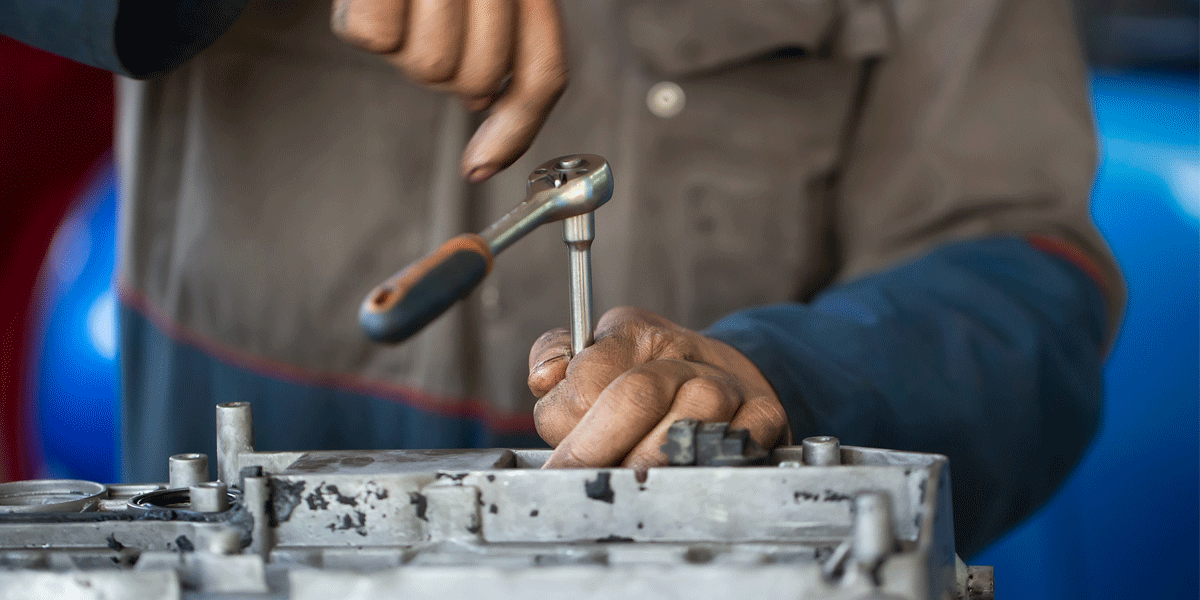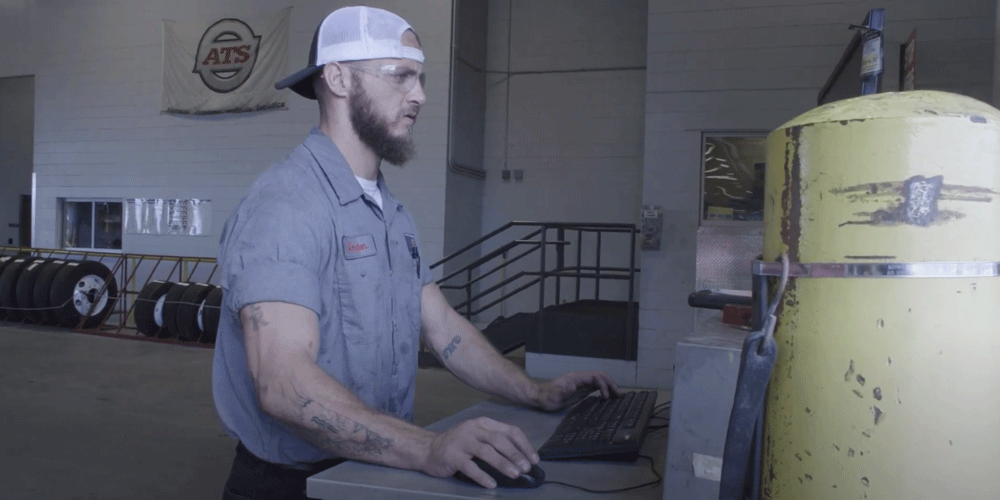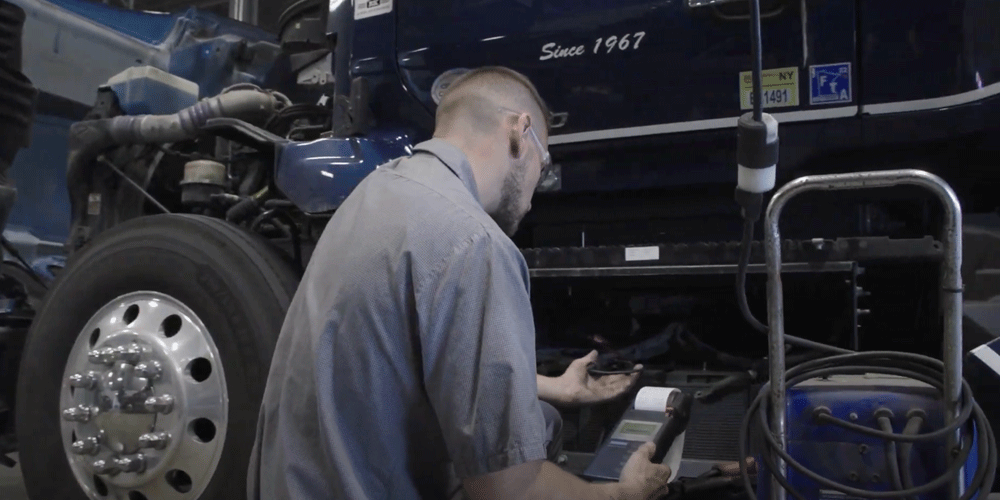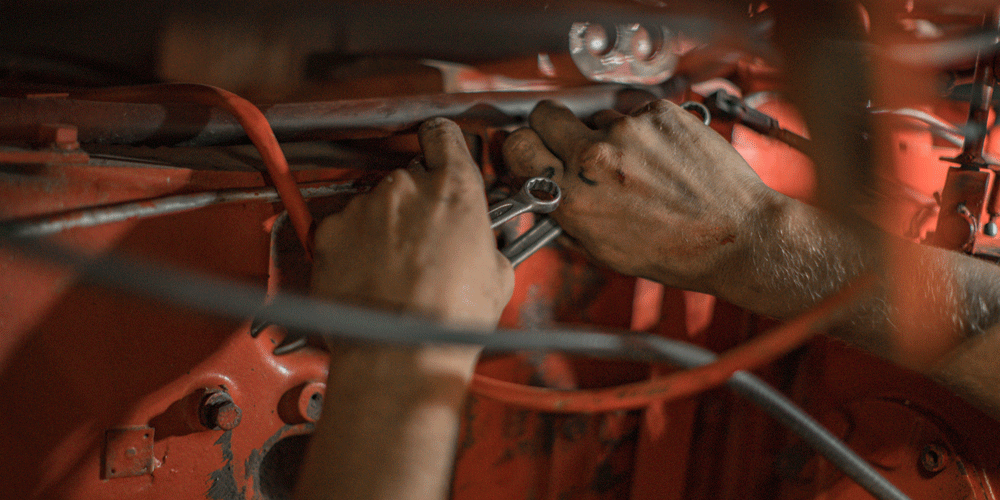
Do you love working with your hands and solving problems? Do you like learning new things? Maybe you also love getting your hands dirty around big semi-trucks and trailers.
If you’re considering becoming a diesel mechanic, there are a few pathways you can take. You can decide to go to college to earn a degree and do an internship or work-study program, or you can pursue on-the-job training.
That’s right: There are companies out there that will pay you while they teach you how to do the job.
There are pros and cons to each of these choices, however. One may be more suitable for your lifestyle and your finances.
As a senior talent acquisition specialist at Anderson Trucking Service (ATS), with a background in mechanics and teaching mechanics, I help people like you make decisions about their careers every day — especially those considering a career in the field.
In this article, I’ll explain the two different career paths you can pursue and the pros and cons of each.
Earning a Diesel Mechanic Degree
Most diesel mechanic programs are typically one- or two-year programs. Here in Central Minnesota, most of them are two-year programs. Diesel mechanic programs provide students with training to maintain and repair heavy-duty diesel-powered equipment. This includes everything from construction equipment, farm equipment, train and marine engines, buses, mining equipment and generators and, of course, large trucks.
A majority of these programs are 25 percent in the classroom and 75 percent in the shop doing hands-on work. Just like any other program, you’ll have books to study and written tests to take. As part of your degree, you’ll also have to take general education courses, like math and English.
You’ll graduate with a degree from an accredited institution, which looks great on a resume.
In the meantime, as you’re going through school, you can either do an internship or a work-study program. Your college will have a list of employers with internship opportunities in the area. From there, you can search the different options to determine what you like best and what works with your schedule. Fortunately, diesel tech internships are often paid.
You can also do a work-study program. These programs are provided based on financial need and provide tuition reimbursement for your work.
As an intern or someone doing a work-study program, you’ll start by learning the basics like oil changes, greasing trucks, replacing lights and doing simple electrical work. As your education progresses, so will your program.
Related: How do diesel mechanics get paid?
Pros of Earning a Diesel Mechanic Degree
The primary pros of attending college and doing an internship or work-study program for diesel mechanics are:
- Earning a degree
- A wider scope of training
- Practice your skills as you earn your degree
- Have a job opportunity waiting for you after college
- Earn money or tuition reimbursement
Having a degree from an accredited institution is the biggest pro of going to college. It shows potential employers you can do something from start to finish. You’ll take that degree with you wherever you go, for the rest of your life.
You may get more training in a variety of areas — from different engines to different manufacturers. For instance, a lot of trucking companies have moved away from doing internal engine work, but you’ll get that training with a college program. It’s handy to have this knowledge.
You’ll also more likely than not gain experience working with different original equipment manufacturers (OEMs) like Volvo, Peterbilt, Mack, Freightliner and so on. This allows you to decide which OEM you like working with most.
When you do an internship or a work-study program, you’ll get to practice your skills. It’ll reinforce what you’re learning in school, which pairs really nicely together and sets you up for a successful career.
There’s also a good chance you’ll be offered a job once your internship finishes. You’ll already be familiar with the company, too.
Getting paid while you polish your skills in the field you’re studying is hard to beat.
Related: Working for a Fleet vs. a Dealership as a Diesel Mechanic (Pros and Cons)
Cons of Earning a Diesel Mechanic Degree
The primary cons of attending college and doing an internship or work-study program for diesel mechanics are:
- High cost
- Time-consuming
- Work-life balance struggles
Cost is obviously a major con of college. Unfortunately, tuition isn’t free. To attend a one- or two-year program in the Central Minnesota area, you’ll be spending at least $12,000 to $20,000 between tuition and books. It simply might not be in your budget right now.
School is a time commitment. Depending on where you are in your life, it may or may not be feasible. Programs can last upwards of two years. You may want to jumpstart your career now instead of waiting.
You may be taking care of a family and simply don’t have the time to attend school. With school and a job, you’re going to be extremely busy.
You might go to school for six hours a day and then work for another six. Going to school full-time and working 20-30 hours per week can become intense very quickly — and that doesn’t add in any personal time. It can be challenging to balance school, work and personal life.
Taking general education courses can also be seen as a con for people who are hands-on learners and don’t enjoy sitting through classroom learning.

Pursuing On-The-Job Diesel Mechanic Training
Instead of going to college, aspiring diesel technicians can look for companies with entry-level positions that offer on-the-job training with in-house trainers. You can find these opportunities online or reach out to local companies to find training programs.
You don’t need to have any experience with mechanics to pursue an on-the-job training program. We’ve hired people who had no experience prior to this, and now they’re impressive technicians. However, people pursuing this option should have a desire to learn and strong problem-solving skills.
You’ll work one on one with a trainer or senior technician starting with the basics. First, you’ll watch them perform tasks and ask questions. As you progress, you’ll begin to do the tasks as they watch you. Eventually, you’ll be able to do the work on your own. Programs like this often last 12-18 months depending on how quickly you catch on and advance your skill set.
Pros of On-The-Job Diesel Mechanic Training
The primary pros of pursuing on-the-job training as a diesel mechanic are:
- Jumpstart your career
- Enjoy a better work-life balance
- Work on real problems
On-the-job training is perfect for individuals who want to jumpstart their careers rather than going to school. You’ll be able to start working full-time immediately and get paid for it. You’ll have good money coming in right away.
You’ll only be working eight hours per day, so you don’t have to worry about balancing school, homework and work. It allows you to enjoy a work-life balance. Most companies offer options to work either a first or second shift, so there’s some schedule flexibility for you there.
These programs are usually a short time commitment. Depending on your confidence level doing the tasks, it may only take you upwards of 18 months until you’re ready to be on your own.
Everything you’re working on is a real-life scenario instead of a mock component. You’ll be working on something in real-time that needs to get back out on the road as soon as possible.
Cons of On-The-Job Diesel Mechanic Training
The primary cons of pursuing on-the-job training as a diesel mechanic are:
- No degree
- Poor on-the-job training programs
- Limited exposure to other OEMs
The primary con of on-the-job training compared to earning a degree is that you won’t earn a degree and won’t take certifications with you. If you want to switch companies after your training, you have to rely on experience alone. If you’ve been a tech for a few years, however, it shouldn't be too difficult. To work through this, you could also get certifications (like Federal Department of Transportation (DOT) certifications, brake certifications and so on) to show your expertise.
Some companies may not have the best training programs, so make sure you research this before you start applying. Make sure there’s room for advancement and they’ll invest in your learning. You don’t want to be stuck doing only basic work like tire and oil changes. Check to see if there’s a path for you to learn and perform electrical and diagnostic work.
If you go through training with a trucking company or dealership, you may risk only learning how to fix equipment from one OEM. That can pigeonhole you if you decide to go elsewhere. There’s a learning curve if you go to a company that does work on different models and types.
Related: How to succeed as a diesel technician
Join the ATS Team as a Diesel Tech!
Choosing between attending college and doing an internship or pursuing on-the-job training as a diesel technician depends on various factors. Attending college and completing an internship provides the advantage of earning a degree from an accredited institution, gaining a wider variety of training and the possibility of job offers upon completion. However, it comes with the drawbacks of cost, time commitment and the need to balance work and personal life.
On the other hand, on-the-job training allows individuals to start their careers immediately, offers better work-life balance and provides real-life work scenarios. However, it lacks the acquisition of a degree and may limit career mobility depending on the training program and company.
Ultimately, individuals should consider their financial situation, personal preferences and long-term career goals when making this decision.
At ATS, we have options for students looking for a work-study program and those looking for on-the-job training.
Our trainers are extremely knowledgeable and great at guiding students to be the best they can be. We also offer a career path in which you can move up the ranks quickly — you won’t be doing the basic oil and tire changes your entire time at ATS.
We also limit these positions so trainers can dedicate adequate time to teaching and fostering talent. You’ll go through other training too, such as computer-based learning followed by quizzes to test your knowledge.
Check out our diesel mechanic openings.




